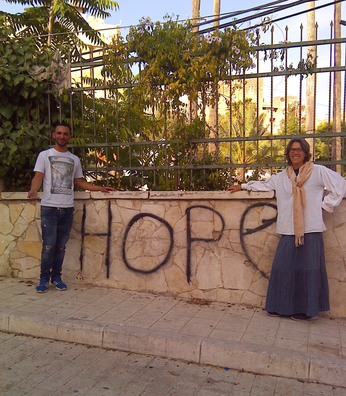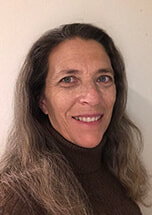|
By BRIDGET LOIS JENSEN and GHASSAN WADDAH JABARI  One reason I (Bridget) returned to Palestine last February was to see people I had met on my first trip in May, 2017, especially my host family in the West Bank city of Hebron. I will never forget the day, May 22, 2017, that I was first in Hebron. There was a general strike that day among Palestinians throughout the West Bank in support of political prisoners on an extended hunger strike. It also happened to be the day President Trump was visiting Bethlehem. Our delegation had started the day in Ramallah. Rather than join many in our group who participated with Palestinians in a march to a checkpoint, I stayed behind in the eerily quiet city to try to visit the Friends School where a friend in Houston had taught in the 1960s. In response to the mid-day call to prayer, which truly felt to be a call to be still and listen for God, I went across from the Friends School to a large park area to sit under the trees. A woman was sitting nearby and we eventually struck up a conversation. I was surprised to learn that she was visiting from Denmark and staying at the Danish House in Ramallah. Her granddaughter was in the West Bank working as a freelance journalist and was obviously busy that day. By early afternoon, our delegation members had all been collected and we set out for Hebron, though we were delayed at a temprorary checkpoint where Israeli soldiers boarded our bus to check passports and generally look us over. Once in the Old City of Hebron, we found that the shopkeepers were not participating in the general strike. It was not because they did not want to be in solidarity, but because their economic situation was so dire. Since 1994, when an American-born Israeli settler opened fire within Hebron’s Ibrahimi Mosque, killing twenty-nine worshipers and injuring 125, the Israeli military has become increasingly restrictive in that part of the city, welding shut all shop doors on what had been the main market street, Shuhada Street, and completely closing access to the street to Palestinians. I went into one of the shops around the corner from the closed street and, in talking with the shopkeeper, discovered that his brother, who was running a hostel in town, had attended Silkeborg Højskole. Another Danish connection in one day! We took a photo together in front of the wall across from the shop where the word “Hope” lives as a visual illustration of the spirit of sumud, which means “steadfastness.” That evening, as our delegation had a late dinner at the community house that serves as the headquarters for Youth Against Settlements, my streak of Danish connections that day continued! I met a young Danish woman who was in the final week of a six-month stay during which she primarily escorted children to and from school. She served to protect the schoolchildren from verbal and physical abuse from settlers and to be a reassuring presence as they passed through military checkpoints. She too had been a folk school student in Denmark. When I returned to Hebron last year, I participated in Open Shuhada Street activities organized by Youth Against Settlements. These activities are the last Friday of February to mark the martydom of those killed in the 1994 massacre. I promised to do something in the U.S. this year in solidarity with the Palestinians in Hebron. Through an internet search, I found the shopkeeper’s brother, Ghassan Wabbah Jabari, and reached out to him. Toward fulfilling my promise, I offer his words: Yes, it is my brother with you at the ‘Hope’ on the wall. I wrote it because there must always be hope and that is where my family and I live in the Old City and have a shop. Right now, I am in Europe. I was having the hostel idea to bring more people to stay in Hebron and we would show them about our life. We want to have more people in the world learn about life in Hebron and open their eyes. But the hostel is closed now because we don't have enough money to keep it going. It is still my dream to open it again and bring more people to Hebron to learn and see. I am in Europe, talking about life in Hebron and Palestine and trying as much as I can to reach more people and to organize places where I can talk and share about our life in Hebron About the school in Denmark, I was there from 2015 to 2016 and had a very nice experience. I learned a lot from it about life and freedom. It made me stronger to fight even more for our life because we deserve to have a better life with freedom and our rights. My dream is not different from other young people in the world who want to enjoy a good life and have freedom.
0 Comments
Leave a Reply. |
Editor InformationBridget Lois Jensen Archives
March 2023
|
Subscribe | Gift |
Submit an Article |
Contact |
© COPYRIGHT 2019 CHURCH AND LIFE.
|

 RSS Feed
RSS Feed